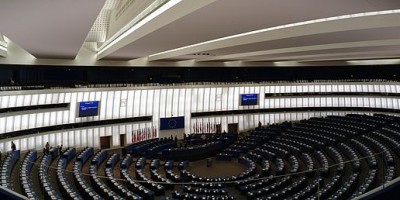Grave mistake of the European MPs

Another example of double standards
Armenia-Azerbaijan, Nagorno Karabakh conflict is the greatest impediment to peace and regional integration in the South Caucasus. Even the leaders of largest powers in the world recognize the fact. Commencement of political clashes in the Middle East has only emphasized that side of the issue. Just resolution of the Nagorno Karabakh conflict is recognized as a major condition for stability, democracy and sustainable development on the post-Soviet space. Nevertheless, it is in light of those aspects that position of the large powers further complicates the matters. Factors, defying healthy logic, emerge. Most importantly, conflicting actions, driven by double standards, of the Western official quarters and parliamentarians provoke concern.
Just recently, a group of European parliamentarians paid an unauthorized by the official Baku visit to the Azerbaijani territories that remain occupied by Armenia. During the held meeting they have tried to endorse separatism and justify Armenia’s policy of aggression under various pretexts. Some even trumpeted: - "In us you will find reliable advocates”. One of those commentators represented France, one of the co-chair states of the OSCE Minsk Group.
Such behavior of European parliamentarians on the backdrop of geopolitical situation in the South Caucasus is ridiculous. It is not anywhere near to being conducive to the establishment of peace and stability or strengthening of democracy in the region. On the contrary, it crosses out everything positive, previously done in this direction. Geopolitical situation has reached critically sensitive level. Even a minor provocation can entail uncertainty, confrontation and new conflicts.
As a matter of fact, by holding talks with separatists in the capacity of the official figures in Khankendi, European parliamentarians had questioned territorial integrity of Azerbaijan. Their actions contradict the very documents and resolutions adopted by the European Union and European Parliament. If those institutions fail to seek explanation from those MPs, then their fairness and objectivity are highly doubtful. So far, neither European Union, nor European Parliament commented on the issue.
Another aspect of the issue is a different criteria used in approaching various ongoing conflicts in the same region. It has to be taken into account that European Union seizes every opportunity to defend territorial integrity of Georgia and even undertakes actions to that end. European parliamentarians do not visit Abkhazia and South Ossetia. Even if certain contacts occur, comments and remarks are made in concordance with the territorial integrity of Georgia. Comments delivered by the European MPs in the Nagorno Karabakh made an impression of utter hypocrisy. Moreover, such posture is obstructive to alleviation of geopolitical risks and threats in the South Caucasus.
Islamophobia on the new level
Let us not forget that certain circles are permeated with Islamophobia. Regrettably, this trend is growing stronger and is more manifested than ever. Those affected, are jealous and biased of the achievements of the Muslim countries. Azerbaijan is the only country in the South Caucasus to conduct independent foreign policy and refuses to sacrifice its national interests. It is the factor of Islamopohobia that empowers exaggerated and "inspirational” ideas voiced by the European parliamentarians in favor of the Armenians in Khankendi.
Apparently, Armenia has failed to develop as a state. In fact, it is completely dependent on Russia and this dependence is only growing. Let us take the news in the Armenia’s media regarding the reinforcement of a Russian military base in Gumry (Armenia’s city locate next to the Turkish border). Additional professional staff was allegedly deployed to the base. If needed, Russian military command announced an option of establishing on-land transit route to Armenia via the territory of Georgia. In other words, Yerevan is impotent in shedding its dependence from Moscow.
In the meantime, Azerbaijan is developing all-around and its military is only growing stronger. Azerbaijan may liberate its occupied territories in the short-run. This must be a thought that Europe denies. Driven by geopolitical and economic interests they comfort Armenians with deceitful statements and attempt to allure them. However, one crucial element is being neglected – unjust political position resembles a boomerang, launched only to backfire!
Indeed, European MPs are playing with fire, ignoring the substance of the Iranian problem. It is by slandering against Azerbaijan that they undermine their positions in the region and foment renewed armed confrontation. Such a situation allows Armenia to pursue extra provocations. Yerevan has always tried to shape a negative image of Azerbaijan, thus justifying its groundless claims. However, such a course of events jeopardizes the South Caucasus in general, and questions the very statehood of Armenia.
Unauthorized by Azerbaijan, visit of the European parliamentarians to Nagorno Karabakh is another subject in terms of international law. They pave the way for new contradictions and conflicts. They provide pretexts for Abkhazians and Ossetians to step up separatist activity. Those actions are also conducive to boosting radical nationalism in the Balkans, Eastern, Central and Western Europe, and ultimately to the establishment of a negative image of Europe in the Muslim world.
Interestingly, the aforementioned falls on deaf ears of certain quarters in the West, as they neglect the growing uncertainty on the global scale. It is beyond doubt that this grave mistake may be detrimental for the very West. In the South Caucasus, a region with very complex geopolitical environment, such games are quite dangerous.
It appears that Europe will further pursue unjust measures and actions against Azerbaijan for the sake of winning over Armenia. Outcome of the choice made, is quite dubious. Moreover, processes are moving towards greater contradictions among the countries of the region. European Parliament impedes the signing of association agreement between the EU and the states of the South Caucasus. Whose interests does it serve? Surely, not the interests of the European Union. Presumably, there are forces within the EU that sabotage the situation. As the situation around South Caucasus intensifies, activity of the stakeholders becomes thought provoking. Apparently more paradoxes are to follow.















































